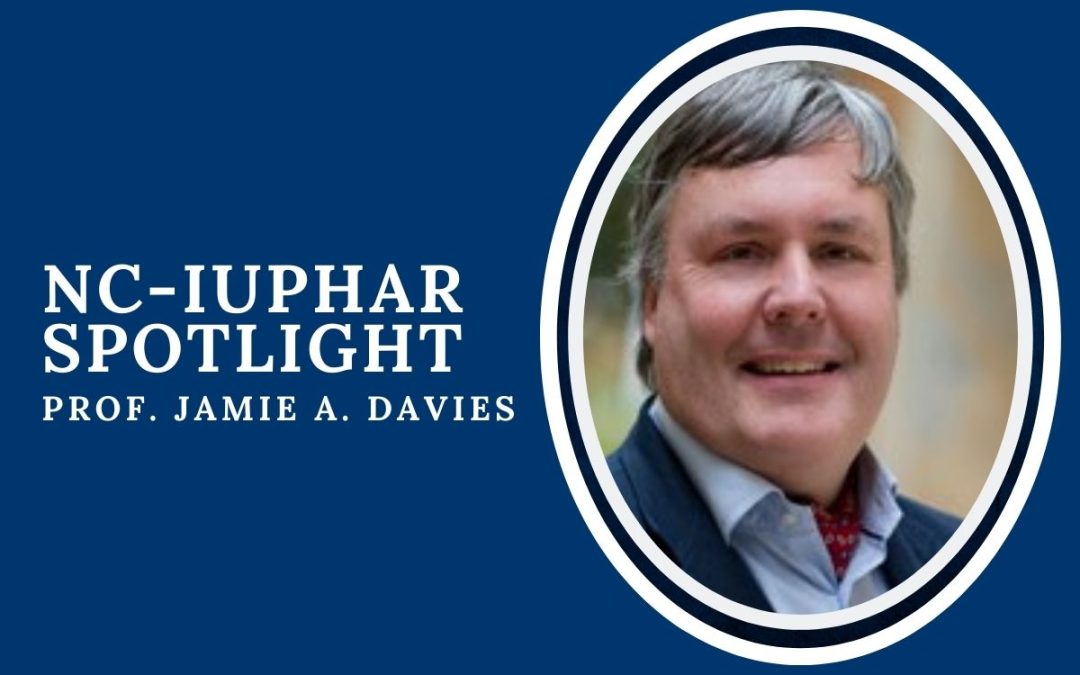NC-IUPHR Spotlight: Prof. Jamie A. Davies, University of Edinburgh
 I read Natural Sciences at the University of Cambridge and remained at that university to gain my PhD in developmental neurobiology, studying with Dr. Geoff M W Cook of the Department of Pharmacology. After a post-doctoral fellowship with the Cancer Research Campaign under the mentorship of David Garrod, I gained a faculty position in the Edinburgh University Medical School, where I have remained ever since. My wet lab work is in developmental biology, organ engineering and synthetic biology, but having a very fallible memory gave me an early interest in databases (which can do our remembering for us!). I ran several and, for this reason, when the late, great pharmacologist, Tony Harmar became terminally ill, he asked me to take over the running of the IUPHAR/BPS Guide to Pharmacology database. It is an honour to continue his work. (The Davies Lab)
I read Natural Sciences at the University of Cambridge and remained at that university to gain my PhD in developmental neurobiology, studying with Dr. Geoff M W Cook of the Department of Pharmacology. After a post-doctoral fellowship with the Cancer Research Campaign under the mentorship of David Garrod, I gained a faculty position in the Edinburgh University Medical School, where I have remained ever since. My wet lab work is in developmental biology, organ engineering and synthetic biology, but having a very fallible memory gave me an early interest in databases (which can do our remembering for us!). I ran several and, for this reason, when the late, great pharmacologist, Tony Harmar became terminally ill, he asked me to take over the running of the IUPHAR/BPS Guide to Pharmacology database. It is an honour to continue his work. (The Davies Lab)
Successes for IUPHAR
Staff in my lab host the IUPHAR/BPS Guide to Pharmacology database, a very highly used and cited, expert-reviewed guide to pharmacological ligands and targets that provides users with a wealth of carefully curated information. If you do not know it, already, do visit – it is open and free and always will be – https://www.guidetopharmacology.org/. We also host and edit IUPHAR’s open access Pharmacology Education Project – https://pharmacologyeducation.org/. These resources do much to promulgate good research and clinical practice and correct nomenclature, and have rich links to and from other databases, including ones for structure, disease and genetics.
Principal Challenges
We have two principal challenges. One is keeping up with all of the data, and we are very, very grateful to members of IUPHAR and its constituent societies for all of the help they give us, especially those who serve on expert committees. The other is finding funding to maintain the databases. They are very highly used and are critical research infrastructure, but maintaining databases does not fall into most funders’ definition of ‘research’. The British Pharmacological Society (BPS) has gallantly kept us afloat for many years now, but if anyone knows of other suitable funding, including from industry, please do let us know: we and BPS would be very relieved to have someone else helping to fund this very valuable resource.
Next Objectives
We plan to extend our coverage of antimicrobial and antiparasitic pharmacology, already remarkable for its coverage of the pharmacology of malaria (see www.guidetomalariapharmacology.org/) and SARS-CoV2 (https://www.guidetopharmacology.org/GRAC/CoronavirusForward). To this end we are building on an existing partnership with GARDP, an alliance for the development of antimicrobials. We will also, of course, continue to keep all aspects of the database up-to-date with the latest research.
Favourite Fun Things to Do
Peacefully chugging along the canals and rivers of Britain in my 78-year-old, ex-coal-carrying canal boat, which I have owned now for more than 30 years. It is a world where nothing moves faster than the pace of a walking horse, and locks still use the hand-operated machinery they were fitted with over 200 years ago: a perfect contrast to our high-tech, always connected professional world.
Recent Publications
- Database: Harding, S; Armstrong,; Faccenda, E; Southan, C; Alexander, SPH; Davenport, A; Pawson, A; Spedding, M; Davies, JA. and NC-IUPHAR (2022) The IUPHAR/BPS Guide to PHARMACOLOGY in 2022: curating pharmacology for COVID-19, malaria and antibacterials. Nucleic Acids Res. 2022 Jan 7;50(D1):D1282-D1294. doi: 10.1093/nar/gkab1010.
- Wet-lab: Lawrence ML, Elhendawi M, Morlock M, Lui W, Lui S, Seidel L, Hohenstein PH, Sjogren AK, Davies JA (2022) Human iPSC-derived renal organoids, engineered to report oxidative stress, can predict drug-induced toxicity. iScience. 2022 Feb 7;25(3):103884. doi: 10.1016/j.isci.2022.103884
- For the public: Davies JA (2014) Life Unfolding. Oxford University Press.
- Lab blog: Waiting for the cells to grow.


